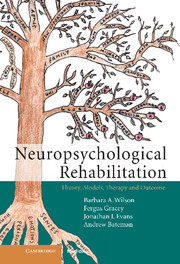22 - Is this approach effective? Outcome measurement at the Oliver Zangwill Centre
from Section 4 - Outcomes
Published online by Cambridge University Press: 03 March 2010
Summary
Introduction
Through the course of this book the approaches to comprehensive neuropsychological rehabilitation that have been discussed demonstrate numerous elements constituting an entire package of rehabilitation which can be described as holistic in its coverage. Outcome of rehabilitation may be conceptualized in terms of objective or observable changes in behaviour, or changes in subjective experience applied to either the client or family members. The focus of outcome measurement may be on the ultimate aims of rehabilitation (e.g. social participation-related goals) or the processes hypothesized to underpin change (e.g. awareness, learning compensatory strategy use, improved confidence, better family relationships). Methods of measurement may equally vary to include observation, questionnaire ratings, or experimental or standardized ‘implicit’ methods designed to elucidate non-conscious processes (such as cognitive and emotional processes).
Within the programme, the range of individual interventions requires a range of methodologies to address the different types of questions concerning effectiveness. Individual elements can be subject to specific outcome evaluations, as illustrated in Chapter 6 about attention and goal management. Similarly, individual patient outcomes can be examined, as illustrated in the case studies. As discussed in our case study chapters, however, the individual elements assessed in the context of a holistic programme need to be seen as parts of the whole process and this means that it is often hard to isolate the efficacy of individual elements.
Studies that have evaluated comparable comprehensive holistic cognitive rehabilitation programmes include Parente and Stapleton (1999); Salazar et al. (2000); Klonoff et al. (2001); Malec (2001).
- Type
- Chapter
- Information
- Neuropsychological RehabilitationTheory, Models, Therapy and Outcome, pp. 334 - 349Publisher: Cambridge University PressPrint publication year: 2009
- 1
- Cited by



